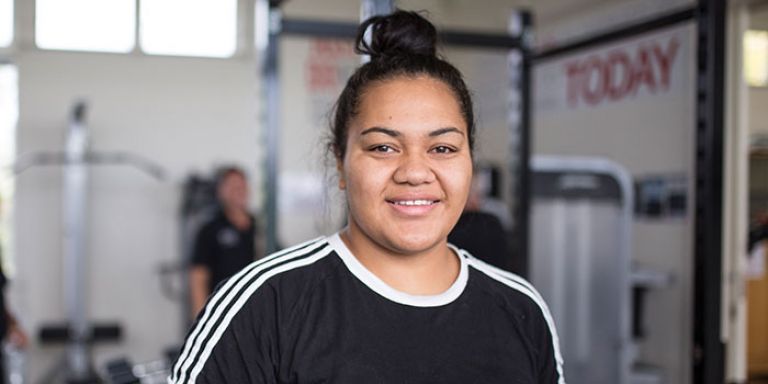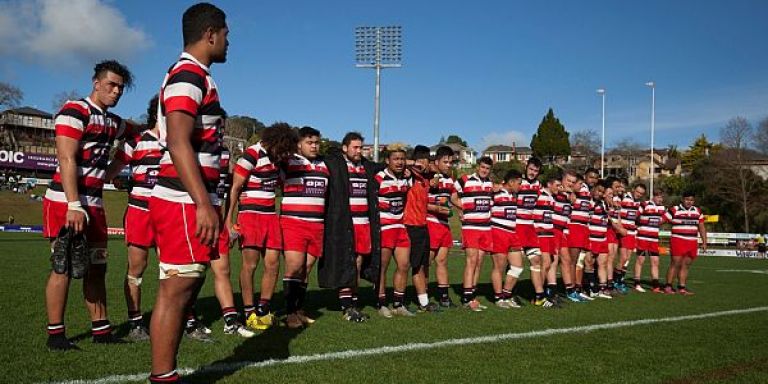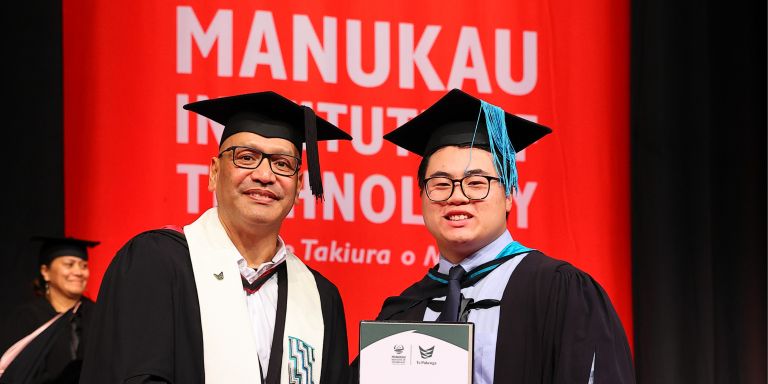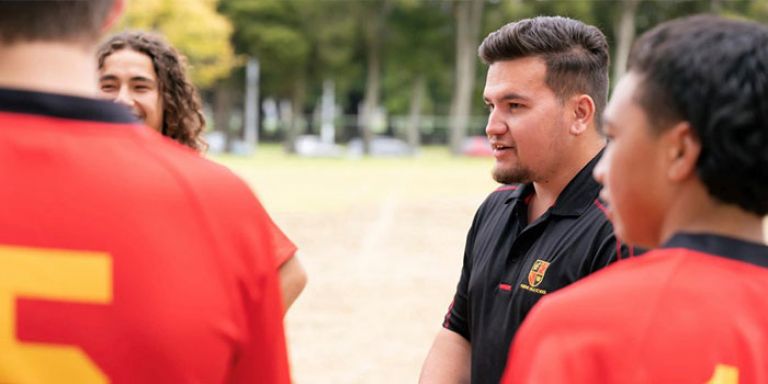Programme highlights
There are so many places a career in sport and exercise can take you.
Study our Bachelor of Applied Sport and Exercise Science and get the skills to become a leader in the industry.
You will learn how to motivate, empower and help others achieve their fitness goals.
You can choose from a variety of courses in exercise physiology, coaching and personal training, rehabilitation and sports massage and nutrition.
Entry requirements
Applicants must meet the following criteria for admission into the programme:
42 credits at NCEA level 3 from the NZQA approved subject list including:
- a minimum of 14 credits in each of two subjects, and
- a further 14 credits from no more than two additional subjects or NZQA approved Domains
OR
- Have a minimum of 60 credits at NCEA Level 2 across four subjects (15 credits per subject) including English and a Science subject or Physical Education
- A minimum of 14 credits at Level 1 or higher in Mathematics or Pangarau on the New Zealand Qualifications Framework (NZQF)
- A minimum of 8 credits at Level 2 or higher in English or Te Reo Māori, 4 credits of which must be in Reading and 4 credits in Writing
OR
- Applicants who do not meet the academic requirements noted above will need to provide attested evidence through an interview demonstrating aptitude, ability to study at degree level and appropriate work or other discipline related experience.
Applicants must be prepared to sign a form for consent for disclosure of information for the NZ Police. A criminal record will not automatically exclude an applicant form entry to the programme. Person with convictions for violence for against a person will not be considered.
Interview Requirements: Applicants without academic requirements will be interviewed as described above.
International students: English Language Entry Requirements
For the minimum English language requirements refer to the requirements set out in the NZQF Programme and Accreditation Rules.
Any applicant whose first language is not English may be required to provide evidence of an overall IELTS (Academic) band score of 6.0 (with no score below 5.5) or equivalent.
Give yourself credit with Recognition of Prior Learning (RPL)
Did you know you can use the knowledge and experience you already have to your advantage?
Your previous work experience and on-the-job skills, volunteering, professional development, and other providers’ qualifications can be recognised as prior learning, matched against credits in our courses, and put towards your qualification – potentially saving you money and possibly helping you to complete your qualification faster Learn more.
Programme structure
You will need to complete the below 13 compulsory courses as well as the required amount of elective courses (360 credits):
Compulsory courses
Level 5
781.514 Structural Kinesiology (15 credits)
Students will be able to have an understanding of the science of kinesiology and the process of human movement, as it relates to physical activity, sport and exercise.
781.518 Human Anatomy and Physiology (15 credits)
Students will be able to have an understanding of the sciences of anatomy and physiology as they relate to physical activity, sport and exercise. Anatomy is the study of the structure of the body and physiology is the study of the function of the body. Both disciplines are fundamental to the study of exercise science, coaching and sporting performance.
781.521 Introduction to Biomechanics (15 credits)
Students will be able to understand major concepts of biomechanics as they relate to performance in sport and exercise.
781.520 He Oranga Hauora (Healthy Lifestyle) (15 credits)
Students will be informed, responsible and proactive in the promotion of hauora and personal health. They will also gain an understanding of the potential role of lifestyle choices in the maintenance and improvement of health status.
781.516 Sport Sociology (15 credits)
Students will be able to understand the historical, social and cultural foundations of sport and exercise science, and gain an understanding of the cultural diversity and identify foundational social-psychological concepts.
781.517 Introduction to Sport as a Business (15 credits)
Students will be able to have an understanding of principles of business, management and leadership in the context of sport, recreation and exercise.
781.515 Coaching Pedagogy (15 credits)
Students will be able to design and introduce students to the theory and practice of sports coaching. An emphasis will be placed on the knowledge and practical skills necessary for coaching within the youth sport environment.
781.519 Exercise Prescription for Personal Trainers (15 credits)
Students will be able to apply an understanding of physiological knowledge to prescribe specific and general training programmes.
Level 6
781.619 Research Methods in Sport and Exercise (15 credits)
This course aims to introduce students to research concepts, design and methods in sport and exercise science. Students will gain knowledge of the processes involved in research design, process and analysis.
781.620 Injury Prevention and Rehabilitation (15 credits)
This course aims to provide students with a basic understanding of the nature of injuries in sport and in the workplace, including: causal factors, assessment, treatment, management and rehabilitation.
781.621 Exercise Programme Design (15 credits)
This course aims to provide students with professional skills in the planning, management and design of integrated physical training programmes. There is emphasis placed on the processes involved in analysing needs, and presenting, monitoring and evaluating programmes.
781.618 Sport and Exercise Nutrition (15 credits)
To develop students appreciation and knowledge of sport and exercise nutrition and its application to sport performance.
781.622 Sport Management and Administration Skills (15 credits)
This course aims to introduce the student to management and administration knowledge that can be applied within the sport and recreation context.
Elective courses
Level 6
You will need to complete three level 6 elective courses (45 credits):
781.623 Applied Exercise Physiology (15 credits)
This course aims to further student knowledge of human physiology and physiological assessment procedures relevant to the study of exercise and sport performance.
127.607 Biomechanical Applications in Sport and Exercise (15 credits)
This course is designed to further student knowledge regarding major concepts of biomechanics as they relate to the mechanical fundamentals of sport, exercise and human motion.
781.624 Biochemistry (15 credits)
This course aims to provide students with relevant knowledge of biochemistry as a foundation for subsequent study in sport and exercise science. There is emphasis on the metabolic pathways involved during physical activity.
781.627 Issues in Sport and Exercise Psychology (15 credits)
This course aims to introduce students to some of the key issues in sport and exercise psychology, whilst developing an analytical approach to the application of psychological theory to sport, exercise and population health.
781.626 Sport and Therapeutic Massage (15 credits)
This course aims to provide students with a strong theoretical and practical basis in basic, therapeutic and sport massage practice.
781.625 Outdoor Education (15 credits)
This course aims to explore the outdoor education principles and philosophies while relating them to the New Zealand Health and Physical Education (NZHPE) Curriculum. Students will have the opportunity to develop an outdoor education plan relating to a school-based outdoor environment, as well as experiencing outdoor activities as both a learner and leader.
781.628 Applied Coaching Pedagogy (15 credits)
This course aims to teach students planning, implementation and evaluation of coaching practice, while applying knowledge of motor skill development, and reflecting on different approaches to coaching pedagogy.
Level 7
You will need to complete 120 credits from any of the following level 7 courses:
115.722 Research Topics in Sports Science (30 credits)
This course is designed to engage students with research in current sport science topics, to provide students with practical experience of the research process and to prepare students for professional employment or further study in the sport and exercise sector.
127.703 Applied Biomechanics in Sport and Exercise (15 credits)
This course aims to provide students with advanced knowledge, skills and professional competencies in the field of biomechanical analysis of sport, exercise and human motion. Recent developments in biomechanical research and their practical application will be investigated. Knowledge will be acquired in research methodologies and skills in using equipment and software will be developed to collect and analyse data.
721.703 Assessment and Rehabilitation of Injuries (15 credits)
This course aims to provide students with advanced knowledge, skills and professional competencies in the field of rehabilitation. Rehabilitation following injury is becoming an increasingly specialised field requiring the combined knowledge of medical consideration of injury and final-phase therapeutic exercise. The course investigates the cause of injuries and the skills required to design and implement appropriate prevention, clinical assessment and rehabilitation programmes for a wide variety of musculoskeletal conditions.
724.702 Community Nutrition and Health Promotion (15 credits)
This course is designed for students who have an interest in nutrition counselling, health promotion and prevention of lifestyle diseases. The topics cover the main principles of health promotion and community nutrition. The course aims to provide students with skills and knowledge in the area of public health issues and health promotion. In particular, students will explore common disease states and appreciate their impact on a person’s food selection and nutritional status. Students will gain a sound understanding of the key principles of clinical nutrition and health promotion, and their potential applications in nutrition practice.
781.707 Applied Sport Coaching (30 credits)
This course aims to provide students with advanced knowledge, skills and professional competencies in the field of sports coaching. The course is founded upon the level one coaching paper and draws further from the sub-disciplines encountered in earlier sport science courses. An emphasis is placed on professional, holistic application of the various sub-disciplines in the interests of coaching athletes for improved performance.
781.708 Physiological Preparation for Sport (15 credits)
This course aims to provide students with advanced knowledge, skills and professional competencies in the field of exercise physiology for the profiling and preparation of athletes for competition.
781.709 Applied Exercise Programming (15 credits)
This course is designed to provide students with the opportunity to apply theoretical knowledge and practical skills of exercise programming and personal fitness training gained throughout the programme to simulated and actual work environments.
781.711 Exercise Prescription for Special Populations (15 credits)
This course provides students with an understanding of individual health problems in the community and of special needs relating to the provision of health, fitness and sports programmes.
781.712 Practicum (15 credits)
To provide students with opportunities within a vocational or workplace setting for the advancement and application of their skills and knowledge in the area of sport and exercise science. In particular, to provide students with the opportunity to demonstrate their ability to put all the skills learned within the programme together in the professional practice setting at a level befitting a sport and exercise science professional.
Do you want to study a single course, without enrolling into the full programme?
Courses within some of our programmes may be offered as an individual Certificate of Proficiency (COP). Programme entry requirements and course fees apply. For more information, please speak to our friendly Ask Me! team.
Career opportunities
Career opportunities include:
- Self-employed or employed consultants
- Self-employed personal trainers
- Advisors in specialist fields (rehabilitation, personal training, coaching, sports science, community health, nutrition, psychology)
- Employment opportunities at gymnasia, recreation centres, sport trusts, educational institutions, sport medicine and physiotherapist clinics as managers, coaches, consultants, performers, lecturers, teachers, trainers, therapists.
For potential salaries visit careers.govt.nz.

















